Menu
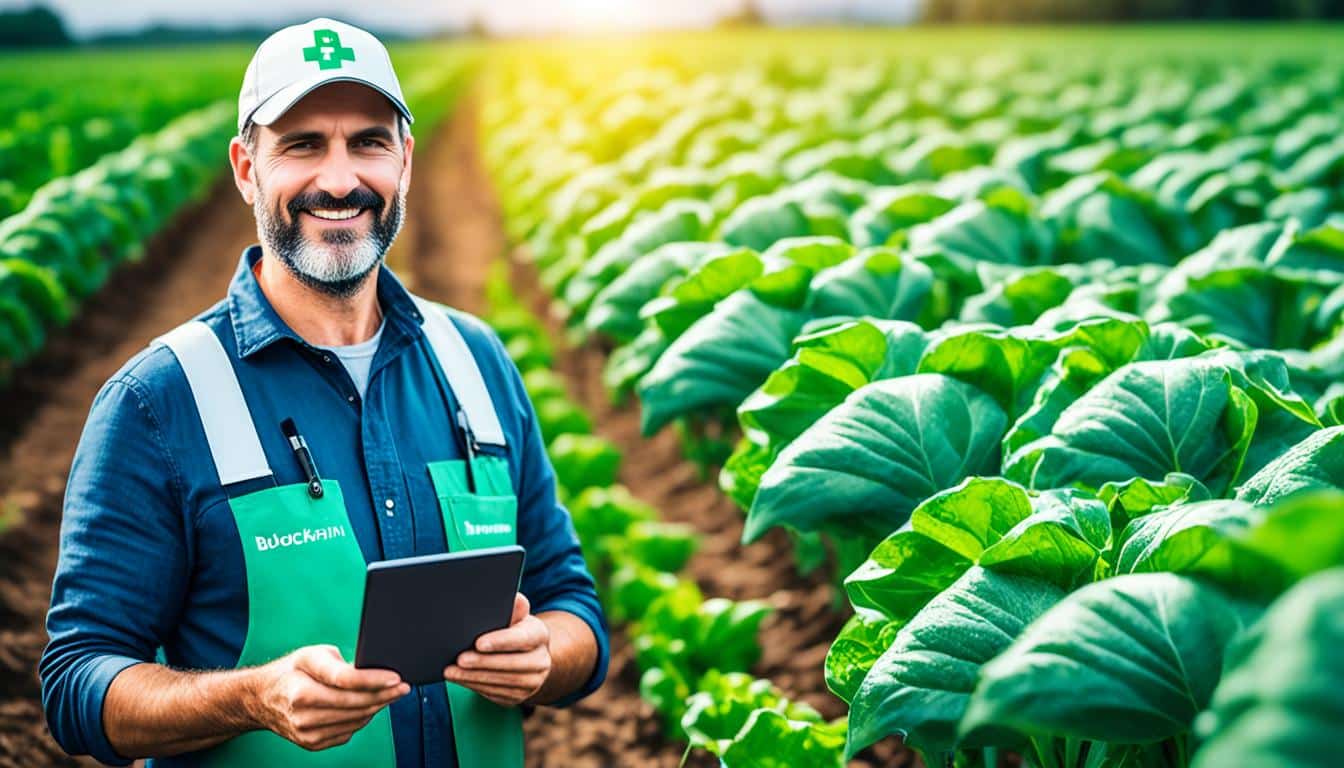
Blockchain technology in farming is set to grow massively. By 2023, it could be worth as much as $430 million. This is a huge leap from the $41.2 million estimated for 2017. Eden Green Technology is part of this growth. They show how blockchain can make the food supply chain more transparent. This is becoming more urgent as around $940 billion of food goes to waste each year. Blockchain helps by giving small farmers better access to the market.
Farming and blockchain are a perfect match. It is changing the way we look at the whole process. For instance, Walmart now takes only 2 seconds to find out where food came from, down from a week, using blockchain. There are also more than 150 startups working on blockchain in agriculture. This change isn’t just about seeing where food comes from. It also helps farmers get better prices and cut costs.
Companies like Eden Green Technology are leading the way to a more sustainable farming future. They use blockchain to share lots of detail about how food is made. This way, customers can make smart choices. Using blockchain in farming is more than a good idea. It’s crucial for our future food system.
Blockchain technology in agriculture is a big leap forward for food safety, sustainability, and clear information. It tackles issues like food recalls, fake products, and the need for trackability.
First known for cryptocurrencies, blockchain now helps beyond digital money. It’s making big moves in agriculture. By 2018, using blockchain in the agriculture supply chain made $60.8 million. By 2023, this is expected to jump to $429.7 million. Blockchain is trusted to bring transparency, better trackability, and food safety.
A study from MarketsandMarkets shows how blockchain can change farming with distributed ledgers and smart contracts. With these, setting up agricultural insurance can be clearer and more effective. Smart farming also gets a boost, offering farmers better ways to manage their crops and animals.
Farming faces many issues that blockchain can fix. It’s great at stopping fake food, saving the economy about $40 billion yearly. The United Nations sees blockchain as key to making our food safer.
Blockchain also shines in making money matters more transparent, helping small farmers get better loans and fair prices. This kind of openness plays a big part in reaching green goals. It makes it easier to prove good practice for things like climate or green bonds.
One more key point is that blockchains can help everyone in farming, even small growers and people in the country. By using data from smart devices, it creates a united front in the food chain. This openness is key to showing where our food comes from.
Blockchains are also very good at keeping data safe and organised. This makes our food system more reliable and trustworthy. People get to choose food that’s made right, in ways that are kind to the earth. Linking blockchain with smart farming is vital for the future of farming that’s strong and open.
The blockchain agriculture market is quickly changing and offers many chances. It was worth 285.34 million in 2022. By 2031, it could be worth 7378.68 million, with a big growth rate of 43.76% each year. This shows how powerful blockchain can be in changing how food moves around the world.
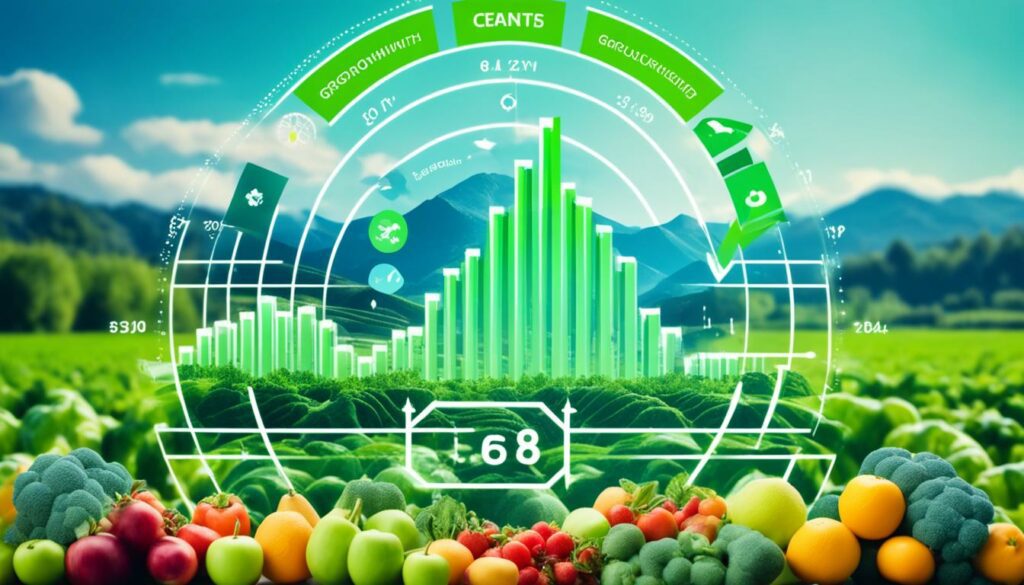
Blockchain is already making a big impact in farming. The market grew to 403.87 million by 2023. By 2031, it might be worth 7,419.9 million. This huge growth is because people want to know more about the food they eat and blockchain can show clearly where it comes from.
In a study from 2024, it was clear that blockchain helps with big issues like food safety and stopping fraud. Every year, 600 million people get sick and 420,000 die from bad food. Using blockchain, we can know where our food comes from and make sure it’s safe.
| Year | Market Value (Million USD) | Growth Rate (CAGR%) |
|---|---|---|
| 2022 | 285.34 | – |
| 2023 | 403.87 | 44.11% |
| 2031 (Projected) | 7,419.9 | 44.11% |
There are many important players in the blockchain agriculture field, like Eden Green Technology. They are making farming better and more sustainable. Using blockchain with smart farming makes farming more profitable and planet-friendly.
When looking at what researchers are studying, it’s clear that blockchain is making more news in areas like wine farming. But there’s also a push for it in olive oil too. The data from databases like Scopus and Web of Science, in November 2022, mentions 479 important studies. These studies help us see how to best use blockchain in farming.
In 2023, North America made the most money from this market. But Europe is set to grow the most in the coming years. This shows the whole world is keen to use blockchain to make farming better. It’s becoming very important for the future of farming globally.
To wrap up, the use of blockchain in farming is growing fast. Technology companies are playing a big part. As this technology continues to grow, it’s important that all involved work together. This way, we can make sure farming is good for the planet, safe, and profitable for everyone.
Blockchain technology is making the food supply chain safer and more honest. Acting as a digital ledger, it tracks every step of the food journey. This makes it easy to know where food came from, simplifies recalls, and ensures food quality.
Keeping our food safe is critical. Shockingly, one in ten people get sick from bad food each year. This leads to around 420,000 deaths. Thanks to blockchain, we can follow food from start to finish, which helps keep us safe.
In places like Nepal, where farming is big business, safe food is a must. Apps that use blockchain, like Verified Organic, make sure our food is really organic. They stop the selling of fake organic food, giving us peace of mind about what we eat.
Knowing where our food comes from matters to 72% of U.S. grocery shoppers. They want brands they can trust. Blockchain shows us everything about our food, building this trust. We can see its whole story, from the farm to our plate.
Though people want to know more about their food, they’re not always ready to pay extra for it. But, blockchain is changing this. Companies are using it to show food is safe and honest. This, in turn, helps people believe in their food choices.
| Company | Key Functionality | Benefits |
|---|---|---|
| IBM Food Trust | Supply Chain Transparency | Improved Efficiency, Waste Reduction |
| Verified Organic | Traceability in Organic Food | Prevents Mislabeling, Ensures Quality |
| AgriChain | Inventory Management | Enhanced Transparency, Access to Finance |
| AgriLedger | Traceability Solutions | Transparency, Risk Management |
| AgriClear | Supply Chain Transparency | Accountability, Efficiency |
Blockchain is changing farming for the better. It makes precision agriculture more accurate. Sensors track things like how crops grow, the weather, and if the soil is healthy. The information they gather helps farmers improve how they farm.
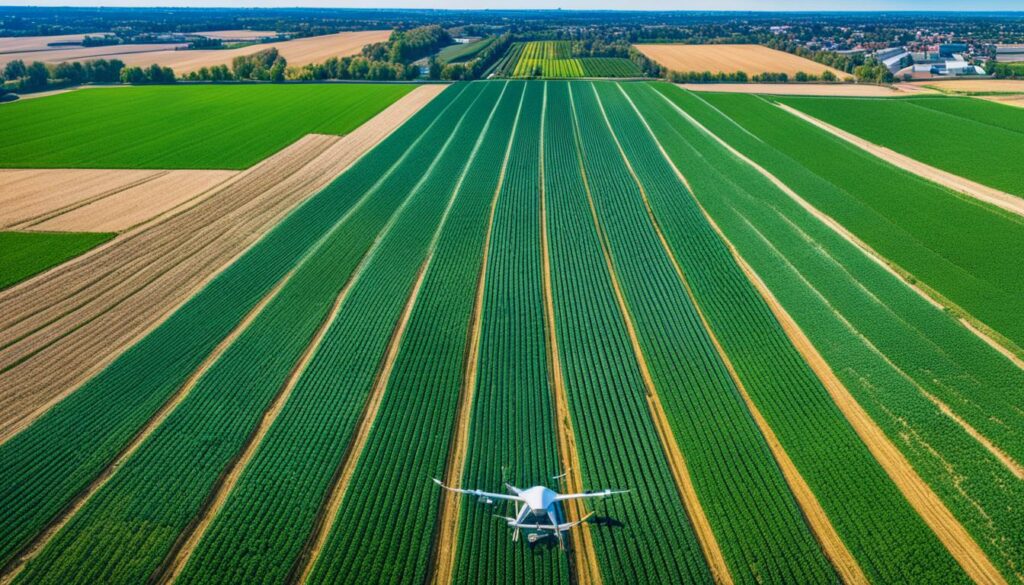
It also makes efficient farming resource management easier. By looking at the data, farmers can use their resources better. They can avoid waste and use water, fertilisers, and other stuff smartly. This is key as our world’s population is set to grow to 9.6 billion by 2050.
Precision agriculture is vital today. The recorded farm data can be made more useful with special computer programs. Then, this refined data is put onto the blockchain. It’s kept safe and everyone can see it. With this info, farmers can make better choices. This is helpful when dealing with things like bad weather and pests.
Blockchain helps farming resource management be very precise. Farmers can control how they use water and nutrients better. Experts like Akash Takyar show how blockchain helps many companies. Even 30 big firms on the Fortune 500 list see its benefits for doing business more efficiently.
Adding blockchain to farming means making things better. It helps make farming more eco-friendly and fact-based. This leads to managing resources well and making more and better crops and food.
The use of the Internet of Things (IoT) in farming, along with blockchain, is shaping smart farm solutions. It connects data and processes to automate and improve farming. This makes sure that farms work efficiently and smoothly.
IoT and blockchain work together to collect and analyse farm data instantly. This helps track things like soil health and water use accurately. By using blockchain, this data is shared safely, making the whole process more open and efficient.
Smart contracts in farming take the benefits of blockchain further. These contracts run without people, doing jobs like paying farmers when crops reach a certain level. They make farm work more accurate and dependable.
They also encourage farming in ways that are kind to the environment. Automated bonuses are given for eco-friendly practices. This means farms can work better, spend less, and take care of resources well.
Here’s a closer look at blockchain’s benefits in farming:
| Feature | Benefit |
|---|---|
| Traceability | Reduces food waste by making the supply chain clear |
| Resource Tracking | Boosts the smart use of water, fertilizers, and energy |
| Smart Contracts | Makes giving pay and using resources automated |
| Operational Efficiency | Lowers costs and makes processes smoother |
| Market Access | Connects directly with global markets |
The mix of IoT and blockchain in farming doesn’t just improve how farms work. It also helps them be kinder to the planet and more open. The future of farming relies on these new technologies.
Blockchain is improving farming by making it more eco-friendly and smart. It tracks and checks if farming is sustainable. This also helps in lessening waste and making sure we see how much carbon farms emit.
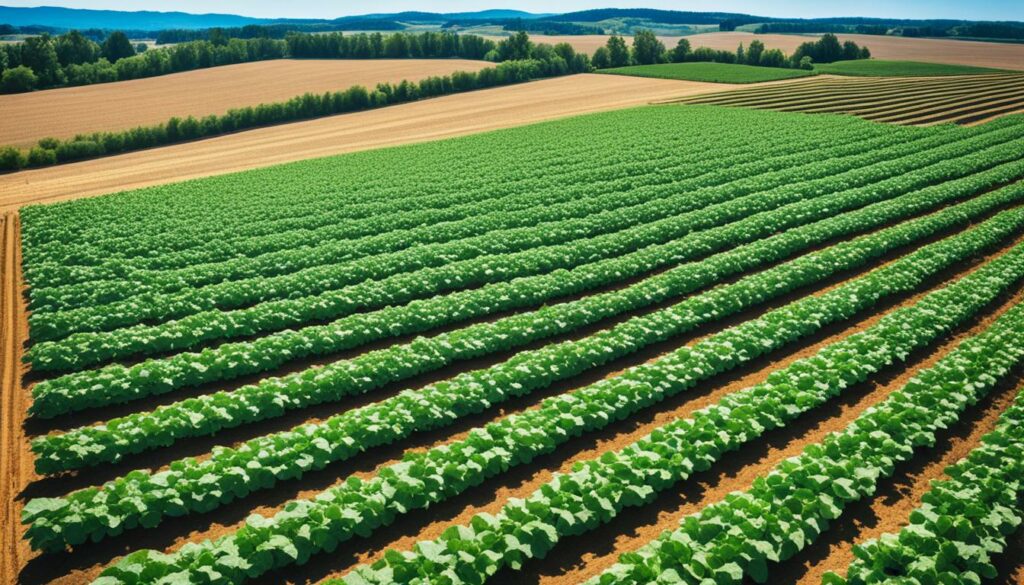
Blockchain lets farmers record how they’re farming in a clear way. This sharing helps to keep plant types varied and documents eco-friendly farming right. It also means good farming practices get rewarded when goals are reached, making sure farms are green and honest.
Blockchain does a great job in cutting down on farming waste. It tracks goods from the farm to your table. Thanks to this, less food is wasted. IBM Food Trust showed this when it kept track of 4 million kilos of olive oil well using blockchain.
Tracking carbon in farming is key, and blockchain makes it easier. It keeps an unchangeable record of all the greenhouse gases. This not only helps farm eco efforts, but it can also prove how green a farm really is.
| Aspect | Blockchain Benefit | Outcome |
|---|---|---|
| Sustainable Practices | Smart Contract Enforcement | Enhanced Compliance |
| Agricultural Waste Reduction | Improved Traceability | Minimised Waste |
| Carbon Footprint Tracking | Accurate Accounting | Reliable Emission Data |
Blockchain tech is changing how we see the flow of food. Now, everyone in the chain can track their produce, right from where it’s grown to where it’s eaten. This makes sharing info easy and stops delays.
Blockchain does more than just track food. In 2019, Nestlé and Carrefour used it to follow Mousline mashed potatoes. This showed its power. Plus, groups like AgUnity help small farmers connect with others and businesses using blockchain tools.
Track food from start to finish helps find and stop bad food and fakes. Using smart contracts for trading cuts out the middlemen. This also lowers costs for all.
Blockchain makes it hard for anyone to lie about what they’ve done. AgUnity helps farmers fight poverty by keeping everything clear. This proves how blockchain boosts trust.
Think about Walmart’s food tracking and coffee chains. They showed everyone can be honest about what they do. And blockchain helps green farming and choices by keeping details safe.
| Year | Initiative | Impact |
|---|---|---|
| 2019 | Nestlé & Carrefour with IBM | Tracking Mousline mashed potatoes |
| Ongoing | AgUnity | Enhancing transparency for millions of smallholder farmers |
| Current | Walmart | Food traceability initiative |
As we move forward, expect more from tech in farming. Blockchain can cover lots of needs. From making farming greener to keeping food safe, it’s full of promise.
Blockchain technology is revolutionising quality control in agriculture and food safety enhancements. It’s changing how we keep food safe and prevent issues. As we saw with COVID-19, more work is now done remotely.
Technology, like mobile and cloud tools, helps keep businesses running. It lets us work from anywhere and still check food safety. Blockchain makes it easier to know where food comes from. This is crucial during and after the pandemic, with more focus on tracing food back to its source.
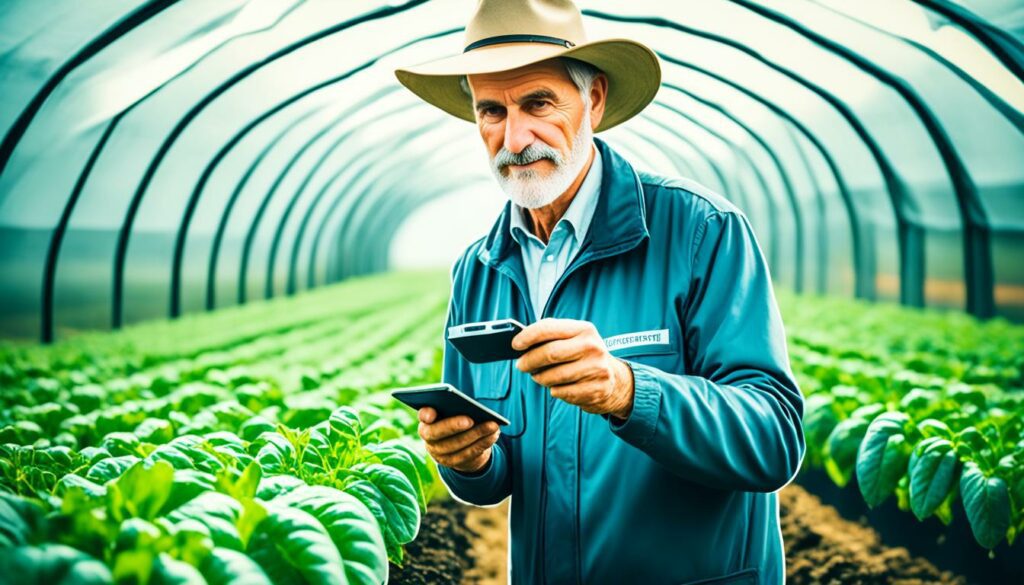
Walmart and others are leading in using blockchain in farming. But, there isn’t one set way everyone uses it yet. This new technology is helping with keeping track of food and quickly dealing with any problems in the supply chain.
The U.S. FDA is making big steps with the “New Era of Smarter Food Safety” plan. It pushes for using advanced tech to trace food better. Now, people want to know more about the food they eat. They want to be sure it’s safe. Knowing where food comes from quickly can help keep people safe.
Blockchain keeps a secure and detailed record of food’s journey. This makes finding and fixing problems with food quality quicker. It helps make sure only safe and good food gets to us. This builds trust in the food we buy.
Businesses are working more to follow food from start to finish. They’re using new tech like IoT and blockchain for this. Big tech companies are also joining in to help track food better. This shows a real push to make food safer.
Blockchain technology could change the way farmers work. It could make farming deals smooth and give fair payments. This is because it keeps clear records and sets up contracts automatically. This makes things easier for farmers.
Blockchain in farming means transactions work well. It keeps clear records of what’s agreed and who’s selling what. Big landowners like Bill Gates and others stand to gain a lot. They will see faster and more accurate deals.
With blockchain, there are fewer middlemen. This means deals happen quicker and more openly. Trust between farmers and those buying from them grows.
Blockchain is also changing how farmers get paid. Now, they can get money straight from buyers. There’s no need for the usual payment channels. This makes payments faster and the prices fair and clear.
It’s estimated that the Smart Agriculture market’s worth will rise to USD 25.4 billion by 2028. This means good things for farmers. It shows we’re moving towards an agricultural world where payments and prices are fair for all.
| Farmland Owner | Farmland Acres |
|---|---|
| Bill and Melinda Gates | 242,000 |
| Stewart and Lynda Resnick | 190,000 |
| John Malone | 2,200,000 |
| Ted Turner | 2,000,000 |
Blockchain tech is changing farming by making it work better and be more honest and green. Its biggest help is in farming insurance. With weather getting wilder, farms need blockchain agricultural insurance apps to keep up and stay safe.
For years, farming insurance has been key to reducing risks. But, old methods sometimes got data wrong or played with it. Blockchain tech stops that by keeping a clear, honest record of all deals. Apps from Etherisc, WorldCover, and Arbol are making farming insurance smarter and better with blockchain.
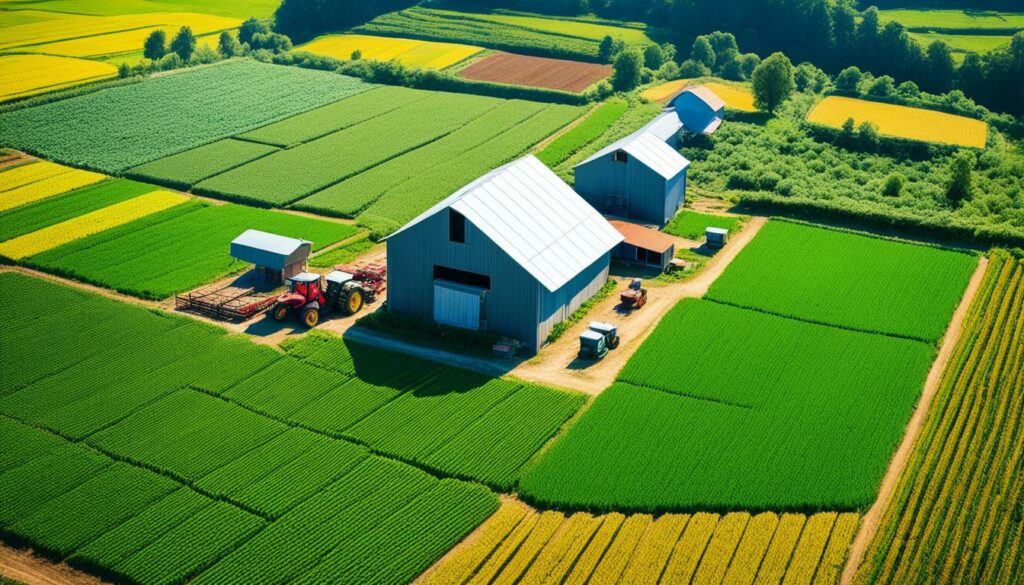
Now, there are smart index contracts – a new way to do insurance. They pay out on their own when set conditions, like extreme weather, are met. This makes things simpler and faster, without needing lots of people involved. Etherisc is leading the way in making these modern contracts for farming insurance.
Blockchain is big in keeping tabs on crops and animals, too. It shows the exact farming conditions for smarter decisions. Farmers can check on crop growth and look after animals better. This helps them be ready for whatever comes and make their farms more eco-friendly.
| Blockchain Application | Benefits | Example Entities |
|---|---|---|
| Agricultural Insurance | Eliminates data biases, ensures verifiable transactions | Etherisc, WorldCover, Arbol |
| Smart Index Insurance Contracts | Automated payments, reduced intermediary need | Etherisc |
| Crop and Livestock Management | Precise tracking, enhanced decision-making | Various blockchain-based solutions |
The agricultural sector faces big hurdles in using blockchain. These challenges stand in the way of everyone fully accepting it. We need smart solutions designed for each issue to make blockchain popular.
One key issue is how tough it is to understand and set up blockchain. It needs a lot of computer power and tech know-how, which might scare off traditional farmers. To get past this, we must make interfaces easier to use. Education is key to help farmers learn about blockchain and use it confidently.
Many farmers are used to older ways and find new tech hard to accept. They feel it might mess up their tried-and-tested methods. Yet, by showing how blockchain can make things better, like increase efficiency and safety, we can get them more interested. It’s important to win their trust by proving blockchain’s worth with real benefits.
For blockchain to work well in farming, we need everyone to use the same data rules. Right now, without common data standards, it’s hard for all parts of farming to connect through blockchain. Setting up clear rules for data use can solve this, making sure data moves easily and correctly. Tools like QR codes and RFID chips are already making it easier to manage farming data.
To make blockchain work better for farming, we need to address these issues with new tech, education for farmers, and better data rules. This way, farming can become more open and efficient.
Blockchain’s potential in farming gets clearer with real-life uses. The IBM Food Trust is a great example. It created a network in the food chain. This helps track goods all the way from production to you.
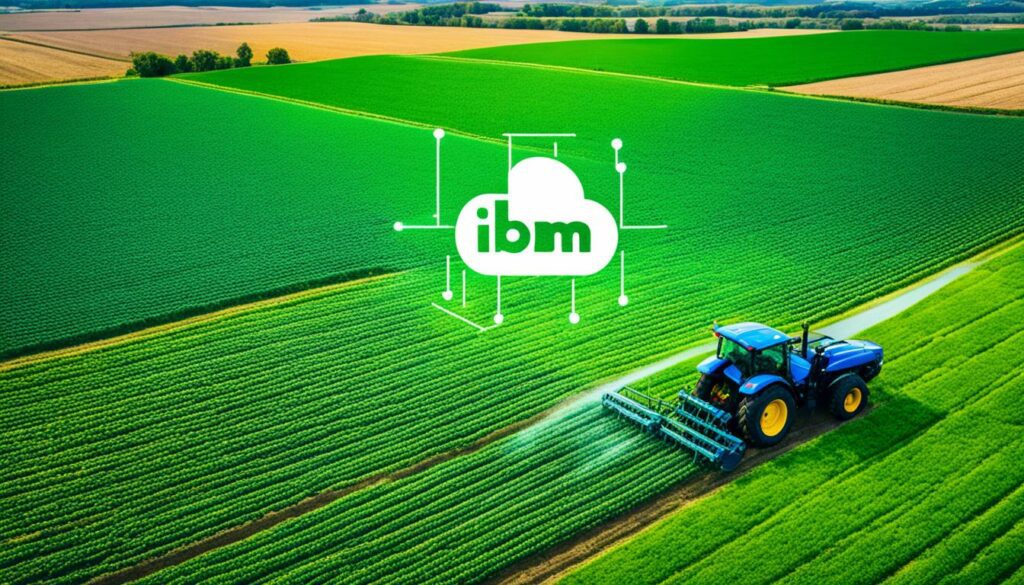
The IBM Food Trust is making a big difference in the olive oil business. It has used blockchain to check over four million kilos of olive oil. This makes sure the oil is high-quality and can be traced back to where it came from. Blockchain is really helping keep food supply chains honest and open.
AgUnity is changing things for small farmers. It uses blockchain to make buying and selling safer and more clear. This means the farmers can get better prices and save on costs. It also opens the door for them to sell their products in global markets, making sure they get paid fairly.
Big stores like Carrefour and Nestlé are also embracing blockchain. They use it to share clear facts about their products, like where they’re from and how they were made. This honesty makes people trust what they’re buying more. It also boosts the reputation of the brands.
Looking at examples like these, blockchain is proving its worth in farming. It helps make the sector more efficient and everyone involved more powerful.
Blockchain, when combined with sensors and IoT in farming, redefines the game. It takes data-driven agricultural practices to a superior level. It does this by ensuring that data is transparent and stored safely. This builds trust between farmers and consumers.
Adding sensors to the mix allows real-time tracking of factors like weather and soil health. When IoT gets involved, a continuous data flow is created. This is vital for smart choices. Thanks to blockchain, this data is always safe and unchanged, which is critical for today’s farming.
Blockchain gives farmers the power of data-driven agricultural practices. It gathers data from many places and turns it into helpful advice. This advice helps farmers make smart choices about their crops, water use, and fertiliser. It means better and more crop production.
With blockchain, precision agriculture shines in boosting crop results and managing resources well. By looking at the collected secure data, farmers find ways to be more efficient. This cuts down on waste and improves how much food is grown sustainably. It’s a clear win for using blockchain in farming.
Blockchain technology has changed agriculture big time. It acts as a base for making global agricultural markets better. It also makes trade between countries easier and cuts the cost of business a lot. Now, farmers and those in agriculture can reach worldwide markets more simply. This tech helps keep things clear and makes the chain of supply work better.
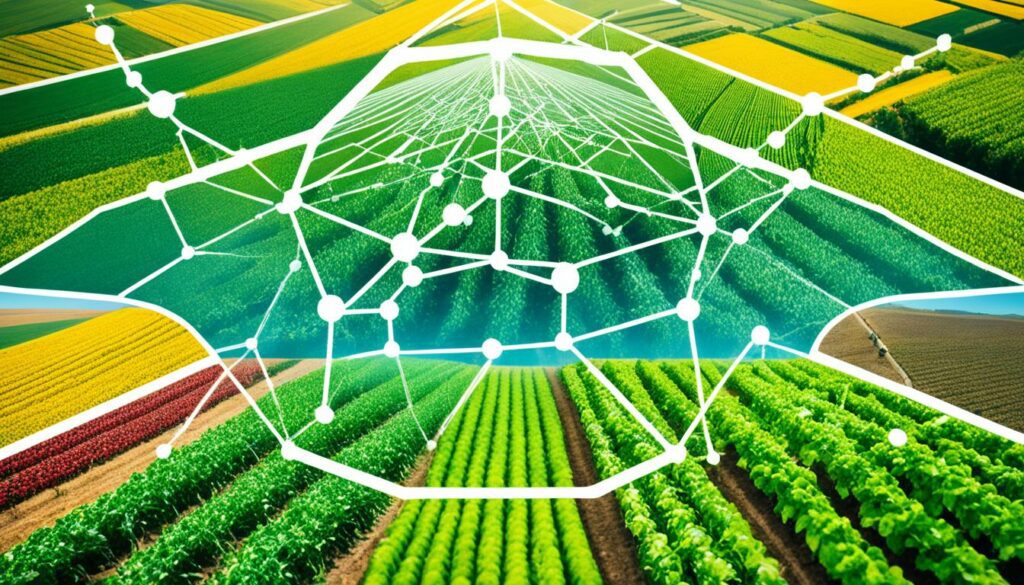
Being able to trade worldwide is key for farming to grow and get more stable. Blockchain uses a safe, clear system to keep track of deals. This means everyone can follow food from the field to the plate exactly. Knowing where food comes from and if it’s real helps people trust it more. It also helps with following global rules.
Blockchain cuts down on the money needed to do business in agriculture. It says bye to go-betweens and makes deals quicker with smart contracts. These smart contracts help with checking and paying for goods. This cost saving means farmers can keep more of what they earn. It makes the market fairer and more even for everyone involved.
Expect to see more of blockchain in global agriculture as it grows. Worth 285.34 million USD in 2022, it’s set to hit 7378.68 million USD by 2031. That’s a big jump each year. This shows how much people like using blockchain to make agriculture better around the world.
Blockchain isn’t just about trading more easily. It also helps nature and making farming in a way that’s good for the planet. For example, it can track and keep safe the special genes of plants. It can also keep notes of how much nature is affected. Knowing these things helps make farming more earth-friendly and lasting.
| Parameter | Value |
|---|---|
| Market Size (2022) | 285.34 Million USD |
| Estimated Market Size (2031) | 7378.68 Million USD |
| CAAGR (2023-2031) | 43.76% |
Blockchain is a technology that benefits us in many ways, especially by making us more aware of food origins and by promoting transparency in farming practices. It allows consumers to track their food’s journey, which helps make better food choices.
Blockchain in farming lets us track each product from start to finish. This makes us more aware of where our food comes from. With clear and unchangeable data, we can make sure our food is produced in a way that’s good for the planet and ethical.
Introducing transparent farming practices through blockchain is a big step forward. It gives us a full view of how and where our food is grown. This helps us trust that our food meets high standards. Trust between us and the people who grow our food is key.
Armed with lots of knowledge, we consumers can really make a difference in farming. By choosing products that are both green and ethical, we can change the farming market for the better. This way, we push farmers to follow rules that help Earth and that are fair and open for everyone.
| Aspect | Consumer Benefit |
|---|---|
| Traceability | Understanding food origins |
| Transparency | Insight into farming practices |
| Empowerment | Influence on sustainable agriculture |
The progress in future agricultural blockchain technologies is exciting for farming. Diving deeper with AI, IoT, and more, these technologies will greatly change how things work in agriculture. This change will show up as better openness, smart use of resources, and more work getting done.
Blockchain is teaming up with IoT, AI, and big data to launch a new chapter for farming. These innovative agricultural trends mean we can gather real-time data. This helps with precise farming and wise decision-making. For example, IBM and Walmart are leading the way in using blockchain to track food, making the food chain more trustworthy.
We’re aiming to feed 9.7 billion people by 2050, making the importance of future agricultural blockchain technologies critical. The market for blockchain in farming is set to grow massively. It will jump from $128.87 million in 2020 to $1.4 billion by 2028, helped by a 47% increase every year. This shows how vital blockchain is for smoother trades, lower costs, and fair markets.
| Year | Market Value ($ Million) | Compound Annual Growth Rate (CAGR) |
|---|---|---|
| 2020 | 128.87 | 47% |
| 2021 | 189.48 | 47% |
| 2025 | 886.18 | 47.1% |
| 2028 | 1,400.00 | N/A |
The mash-up of blockchain, AI, and IoT will keep changing farming. For example, IoT sensors will go from monitoring 190,000 data points on a farm in 2014 to 4.1 million by 2050. This spike offers detailed info on how crops and soil are doing. Users can make the most of resources with these innovative agricultural trends. This aims for food production that’s both global and green.
Looking back at what we found, it’s clear that blockchain has a big role to play in changing how agriculture works. In our study, everyone we asked said blockchain could solve problems. These included tracking products during COVID-19, handling data, and stopping fake products and dodgy deals. By dealing with these issues, blockchain can really make a difference. It helps to make everything work better and be more open along the way.
When we talked to the CEOs of four agriculture companies in Pakistan, they pointed out seven good things about blockchain. They found that using blockchain cut the time to track transactions by 60%. It also reduced mistakes in the supply chain by half. These changes made things run smoother and they made people trust the goods more. It shows how important blockchain is in building trust between everyone involved.
There were tricky parts too, like the cost at the start and the knowledge needed to use it. But most people agreed that the upsides of blockchain were bigger than these challenges. Blockchain makes every deal clear and can’t be changed later. This honesty in transactions is key for making the whole agriculture system work better. More and more, focusing on blockchain in farming is vital. It promises to strengthen the food system worldwide, making it stronger, more efficient, and open to all.
Blockchain technology improves different parts of farming with its secure system. It makes everything clearer by tracing products and making supply chains more efficient. This helps farmers and customers alike.
Blockchain plays a key role in farming’s digital shift. It creates a safe record-keeping system, boosting trust in data. This tech works with smart devices and contracts to better farm methods.
Agriculture wants blockchain to make food safer and supply chains clearer. It ensures farms use fair practices. The tech is vital for today’s farming to show it’s eco-friendly and ethical.
By 2022, the market hit 285.34 million. It’s expected to grow to 7378.68 million by 2031, a huge leap. This quick rise shows farmers and companies are eager to use it.
Top names in this area are Eden Green Technology, IBM’s Food Trust, AgUnity, Carrefour, and Nestlé. They lead in using blockchain to make farming and food chains work better.
Blockchain ensures food is safe and top-quality by tracking its journey step by step. This quickens spotting and solving food risks. It’s vital in delivering safe food to people.
Working together, they better check crop conditions, smartly use resources, and make decisions on data. This mix boosts harvests, cuts waste, and fosters green farming.
These smart solutions link things like sensors and blockchain for smooth farm operations. They use up-to-the-minute info to run farms better, making them more efficient and productive.
Blockchain helps green farming by watching over and guaranteeing eco-efforts. It trims waste and clearly notes the farm’s effect on the environment. This backs careful farming.
Blockchain shines a light on the food’s path, keeping a real-time, unchangeable record. Info is clear and right, boosting trust and honesty in the chain.
It makes paying and trading in farming clearer with solid records and contracts. This way, it’s easier to do business with direct, fair deals and skip middlemen.
Yes, it can. With smart contracts, it makes insurance react automatically to set events. This helps farmers reduce some risks and stand strong against bad weather.
Farming faces hurdles like learning new tech, pushbacks from old-school farmers, and the need for common data rules. Overcoming this needs teaching, practical fixes, and open minds.
Examples include IBM’s Food Trust for better product tracking and AgUnity boosting small farmers. Carrefour and Nestlé’s projects show how this tech boosts trust and openness.
It gathers and checks info from gadgets and sensors to make smart choices. This fine-tunes crop growing and resource use, making farming smarter and greener.
It eases worldwide trade and costs by offering a trusted, open system. It smoothens deals, opening new markets for those in farming and food business.
It tells consumers where their food comes from and how it’s grown. Knowing this helps people pick food that matches their values for caring for the planet and being ethical.
Look ahead to more mixing with AI, automated tasks, and advanced data use. These changing stories will make farming even smarter, weaving in green ways and fighting climate issues.